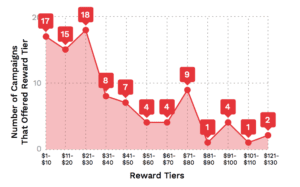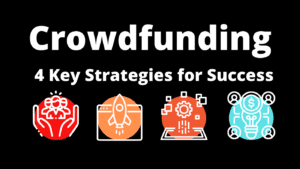Crowdfunding has emerged as a game-changer for aspiring entrepreneurs, revolutionizing the traditional methods of raising capital. With its ability to connect entrepreneurs directly with potential investors and supporters, crowdfunding has transformed the face of entrepreneurship. This article explores the profound impact of crowdfunding on the business landscape, highlighting its role in empowering innovative ideas and providing a platform for entrepreneurial success. Get ready to discover the incredible influence that crowdfunding holds in shaping the future of startups and small businesses.

Overview of Crowdfunding
Definition of Crowdfunding
Crowdfunding refers to the practice of raising funds for a project or venture through a large number of people, typically via the internet. It allows entrepreneurs, artists, and individuals with innovative ideas to gather financial support from a diverse group of individuals, known as the crowd.
Evolution of Crowdfunding
The concept of crowdfunding has evolved significantly over time. It traces back to the 18th century when it was used to finance public works projects. However, with the advent of the internet and social media, crowdfunding has gained immense popularity and become more accessible to the masses. Platforms such as Kickstarter and Indiegogo have played a crucial role in revolutionizing the crowdfunding landscape.
Types of Crowdfunding
There are various types of crowdfunding, each serving different purposes. Donation-based crowdfunding involves soliciting funds without offering any direct financial return. Reward-based crowdfunding offers non-financial incentives, such as exclusive access to products or experiences, in exchange for contributions. Equity crowdfunding allows individuals to invest in early-stage companies in return for equity. Lastly, debt crowdfunding, also known as peer-to-peer lending, involves borrowing money from the crowd with an agreement to repay with interest.
Advantages of Crowdfunding
Crowdfunding offers numerous advantages for entrepreneurs. Firstly, it provides a platform to showcase creative ideas and attract a community of supporters who share the same passion. Additionally, crowdfunding can serve as market validation, allowing entrepreneurs to gauge consumer demand before launching a product or service. Moreover, it offers an alternative to traditional funding, reducing the reliance on banks or venture capitalists.
Challenges of Crowdfunding
Despite its benefits, crowdfunding also presents challenges. One of the primary challenges is the need to create an engaging and compelling campaign to stand out in a crowded marketplace. Moreover, entrepreneurs must maintain transparency and accountability throughout the crowdfunding process, as trust is crucial in garnering support. Additionally, the pressure to meet backer expectations and deliver on promises can be demanding for entrepreneurs.
Crowdfunding as a Source of Capital
Traditional Funding vs Crowdfunding
Traditional funding methods, such as bank loans or venture capital investment, have long been the go-to options for entrepreneurs seeking capital. However, crowdfunding offers distinct advantages over traditional funding. While traditional funding typically requires collateral or an established track record, crowdfunding opens doors to individuals with limited financial resources or those exploring unconventional ideas. Crowdfunding also provides a broader reach, enabling entrepreneurs to tap into global networks.
Impact of Crowdfunding on Entrepreneurial Finance
Crowdfunding has disrupted the traditional entrepreneurial finance landscape. It has democratized access to capital, allowing entrepreneurs from diverse backgrounds to pursue their dreams. By bypassing the traditional gatekeepers of finance, crowdfunding has emerged as a powerful tool in empowering early-stage entrepreneurs. It enables them to realize their ideas and bring them to market without the constraints imposed by traditional funding sources.
Accessibility of Capital for Small Businesses
Small businesses often struggle to secure funding through traditional means, as they may lack established creditworthiness or track records. Crowdfunding offers these businesses an opportunity to access capital directly from their target audience. By presenting their ideas and products to potential customers, small businesses can build a community of supporters and secure the financing needed to thrive. This accessibility of capital has the potential to transform the small business landscape, fostering innovation and driving economic growth.
Insights into Consumer Demand and Market Potential
Crowdfunding platforms serve not only as a source of capital but also as a valuable tool for entrepreneurs to gain insights into consumer demand and market potential. Through crowdfunding campaigns, entrepreneurs can gauge the interest of potential customers and adjust their offerings accordingly. Backer feedback and engagement provide real-time market validation, allowing entrepreneurs to refine their products or services, ultimately increasing their chances of success in the marketplace.
/hIO0KH9JfsE”
Empowering Entrepreneurship
Democratizing Entrepreneurship
One of the most significant impacts of crowdfunding is its ability to democratize entrepreneurship. Traditionally, funding was limited to a select group of individuals or institutions that had the financial resources and networks to support entrepreneurial ventures. However, crowdfunding allows anyone with a compelling idea and a solid plan to access a wide pool of potential investors, eliminating the traditional barriers to entry and leveling the playing field.
Increasing Diversity in Entrepreneurship
Crowdfunding has also played a pivotal role in promoting diversity within the entrepreneurial ecosystem. Historically, certain demographics, such as women and minority entrepreneurs, faced systemic barriers in accessing capital. However, crowdfunding platforms provide an inclusive environment that encourages individuals from all backgrounds to participate. This increased diversity brings fresh perspectives, fosters innovation, and contributes to a more vibrant entrepreneurial landscape.
Decreasing Barriers to Entry
Launching a new business often requires significant financial resources, making it challenging for aspiring entrepreneurs to enter the market. Crowdfunding addresses this issue by reducing the barriers to entry. It allows entrepreneurs to present their ideas directly to the public, bypassing the need for extensive personal savings or loans. This has led to a surge in entrepreneurial activity, as individuals with limited financial resources now have a viable avenue to turn their ideas into reality.
Fostering Innovation and Creativity
By enabling individuals to seek funding for unconventional and innovative ideas, crowdfunding has fostered a culture of innovation and creativity. Entrepreneurs are no longer bound by the limitations imposed by traditional funding sources, allowing them to explore bold concepts that may lead to groundbreaking discoveries. Crowdfunding thus fuels the engine of innovation, inspiring entrepreneurs to think outside the box and push the boundaries of what is possible.
Building Community and Engagement
Engaging and Involving the Crowd
Crowdfunding is not just about financial transactions; it is about building a community of like-minded individuals who are passionate about a particular project or idea. Successful crowdfunding campaigns actively engage and involve their backers throughout the process, making them feel like valued contributors rather than mere donors. This engagement fosters a sense of ownership and pride among backers, resulting in a deeper connection to the project and increased long-term support.
Building a Supportive Community
Crowdfunding platforms have become breeding grounds for supportive communities. Backers often share common interests, and their contributions often extend beyond financial support. They provide valuable feedback, spread the word about the project, and offer support beyond the initial funding campaign. This sense of community strengthens the bonds between entrepreneurs and their backers, creating a supportive ecosystem that extends beyond the confines of the crowdfunding campaign.
Leveraging User Feedback and Ideas
Crowdfunding campaigns provide a unique opportunity for entrepreneurs to receive direct feedback from their target audience. Backers are genuinely invested in the success of the project and offer valuable insights and suggestions for improvement. By actively listening and incorporating this feedback, entrepreneurs can refine their offerings and ensure that they meet customer expectations. This collaboration between entrepreneurs and their backers leads to the development of superior products or services.
Collaborative Project Development
Crowdfunding platforms have transformed the way projects are developed. Rather than relying solely on a small team, entrepreneurs can tap into the collective expertise and skills of the crowd. Backers often bring diverse backgrounds and experiences to the table, allowing for collaborative problem-solving and ideation. This collaborative approach not only enhances the quality of the final product but also deepens the sense of community and involvement among backers.

Networking and Marketing Opportunities
Expanding Entrepreneurial Networks
Crowdfunding offers entrepreneurs unparalleled opportunities to expand their networks and connect with individuals who share their interests or can contribute to their projects. Backers often have their own networks and may introduce entrepreneurs to potential partners, mentors, or customers. This organic networking opens doors to new collaborations and business opportunities, further fueling the growth and success of entrepreneurial ventures.
Brand Awareness and Marketing Benefits
Launching a crowdfunding campaign provides entrepreneurs with a unique marketing platform to build brand awareness. Through compelling storytelling and engaging content, entrepreneurs can capture the attention of their target audience and generate buzz around their project. This increased visibility can have long-lasting effects, attracting not only backers but also customers and potential investors. Successful crowdfunding campaigns have the potential to create a strong brand identity and establish a loyal following.
Amplifying Reach and Exposure
Crowdfunding campaigns have the power to reach a global audience, transcending geographic boundaries and traditional marketing channels. Entrepreneurs can leverage social media platforms, email marketing, and word-of-mouth to amplify their reach and expose their projects to thousands, if not millions, of potential backers. This unprecedented level of exposure allows entrepreneurs to attract support from individuals who may otherwise never have encountered their ideas or products.
Risks and Challenges for Entrepreneurs
Oversaturation and Competition
With the rapid growth of crowdfunding, the marketplace has become increasingly saturated, making it more challenging for entrepreneurs to stand out. As more projects vie for attention and funding, entrepreneurs must find unique ways to capture the interest of potential backers. A creative and well-executed marketing strategy, coupled with a compelling value proposition, is crucial to differentiate from the competition.
Maintaining Trust and Accountability
Crowdfunding relies heavily on trust, as backers must believe in the entrepreneur's ability to deliver on their promises. Failing to meet expectations can damage both the entrepreneur's reputation and the overall perception of crowdfunding as a reliable source of financing. It is essential for entrepreneurs to maintain open lines of communication, provide regular updates, and fulfill their obligations to ensure trust and accountability throughout the crowdfunding campaign.
Intellectual Property Concerns
Launching a crowdfunding campaign exposes entrepreneurs to potential intellectual property risks. The early disclosure of ideas and concepts may increase the likelihood of intellectual property theft or infringement. Entrepreneurs must carefully assess the need for patent protection and consider the potential risks associated with disclosing sensitive information during the campaign. Seeking legal advice and taking appropriate measures to safeguard intellectual property rights is crucial in mitigating these risks.
Managing Expectations and Delivering on Promises
Crowdfunding backers have high expectations and rightfully expect entrepreneurs to fulfill their promises. Meeting production deadlines, delivering a quality product, and providing excellent customer service are essential for maintaining positive relationships with backers. Entrepreneurs must carefully plan and manage their resources to ensure that they can meet the demands of a successful crowdfunding campaign. Transparency and effective communication are key in managing backer expectations and achieving long-term success.
Case Studies on Crowdfunding Success Stories
Oculus Rift: Revolutionizing Virtual Reality
Oculus Rift, a virtual reality headset, made waves when it launched its crowdfunding campaign on Kickstarter in 2012. The campaign aimed to bring the concept of affordable virtual reality to the masses. Within 36 hours, Oculus Rift surpassed its funding goal, raising over $2.4 million. This overwhelming response not only provided the necessary capital to develop the product but also demonstrated the significant demand for virtual reality experiences. Oculus Rift's successful crowdfunding campaign played a pivotal role in attracting the attention of industry giants and ultimately culminated in its acquisition by Facebook for $2 billion.
Pebble: Pioneer in the Smartwatch Industry
Pebble, a smartwatch manufacturer, launched its first crowdfunding campaign on Kickstarter in 2012. The campaign aimed to bring Pebble's innovative smartwatch concept to life, offering backers the opportunity to be among the first to own the groundbreaking device. Pebble shattered crowdfunding records by raising over $10 million, making it one of the most successful campaigns at the time. Not only did the campaign provide the necessary capital to bring the product to market, but it also generated immense excitement and anticipation among tech enthusiasts. Pebble's success on Kickstarter laid the foundation for its future as a prominent player in the smartwatch industry.
Exploding Kittens: Record-breaking Card Game
Exploding Kittens, a card game blending strategy and luck, launched its crowdfunding campaign on Kickstarter in 2015. The creators set a modest initial funding goal of $10,000 to produce the game. However, the campaign captured the attention of backers worldwide and quickly became a viral sensation. Ultimately, Exploding Kittens raised over $8.7 million, making it the most-backed Kickstarter campaign at the time. The game's playful and humorous concept, coupled with clever marketing and engaging campaign updates, resonated with a broad audience. This strategic use of crowdfunding transformed a simple card game idea into a global phenomenon.
Coolest Cooler: All-in-One Outdoor Solution
The Coolest Cooler, a multi-functional cooler equipped with a blender, Bluetooth speakers, and other innovative features, launched its crowdfunding campaign on Kickstarter in 2014. The campaign aimed to fund the production of the Coolest Cooler, offering backers the opportunity to be among the first to own this groundbreaking product. Despite facing initial challenges, including production delays and unexpected costs, the campaign ultimately raised over $13 million and became one of the most successful crowdfunding campaigns in history. The Coolest Cooler demonstrated the power of crowdfunding in supporting ambitious and innovative ideas, even in the face of unforeseen obstacles.
Regulatory Landscape and Future Outlook
Current Regulatory Environment
Regulatory frameworks surrounding crowdfunding vary across different countries and jurisdictions. Some governments have implemented specific regulations to protect investors and ensure transparency in crowdfunding campaigns. These regulations often include limits on the maximum amount that can be raised, eligibility criteria for both entrepreneurs and backers, and stringent reporting requirements. The current regulatory environment aims to strike a balance between facilitating access to capital for entrepreneurs and protecting the interests of investors.
Impact of Regulations on Crowdfunding
Regulations have undoubtedly shaped the crowdfunding landscape. While they impose additional compliance burdens on entrepreneurs, they also promote transparency and instill confidence among backers. Regulations provide a level of assurance to both entrepreneurs and backers that the crowdfunding platform operates in a fair and secure manner. Moreover, regulations have paved the way for the emergence of licensed crowdfunding platforms that offer additional safeguards and protect the interests of both parties involved.
Global Perspectives and Trends
Crowdfunding has gained significant traction on a global scale, with countries worldwide recognizing its potential to drive economic growth and foster innovation. Different regions have experienced unique crowdfunding trends, with some witnessing a surge in equity crowdfunding, while others focus on donation-based or reward-based models. The rise of blockchain technology and the utilization of cryptocurrencies in crowdfunding campaigns have also emerged as key trends, providing individuals with more decentralized and accessible funding options.
Predictions for the Future of Crowdfunding
The future of crowdfunding is promising, with continued growth and advancements on the horizon. As regulations mature and become more streamlined, the barriers to entry for both entrepreneurs and backers are likely to diminish. Technological advancements, such as artificial intelligence and machine learning, may play a significant role in enhancing crowdfunding platforms' capabilities, facilitating better project matching and improving the overall user experience. Additionally, crowdfunding may extend beyond financial support, encompassing a wider range of resources and expertise, further empowering entrepreneurs to bring their ideas to life.
Crowdfunding Platforms and Ecosystem
Popular Crowdfunding Platforms
Several crowdfunding platforms have emerged as leaders in the industry, offering entrepreneurs a diverse range of options to launch their campaigns. Kickstarter and Indiegogo are two of the most prominent platforms, catering to various crowdfunding models. Kickstarter focuses on creative projects and innovative ideas, while Indiegogo supports a broader range of projects, including nonprofit initiatives and personal fundraisers. Other notable platforms include GoFundMe, Patreon, and Seedrs, each with its own unique features and target audience.
Key Players in the Crowdfunding Ecosystem
Beyond the crowdfunding platforms themselves, the ecosystem surrounding crowdfunding has expanded to include various key players. These players provide essential services that support entrepreneurs and help them navigate the crowdfunding landscape. Marketing agencies specializing in crowdfunding campaigns assist entrepreneurs in crafting compelling messages and reaching their target audience. Additionally, fulfillment and manufacturing partners help entrepreneurs deliver on their promises by handling product production, packaging, and shipping.
Success Factors for Crowdfunding Campaigns
While each crowdfunding campaign is unique, certain success factors are consistently observed among the most successful campaigns. A compelling and well-executed pitch is crucial, capturing the attention and interest of potential backers. Clear and transparent communication throughout the campaign builds trust and encourages ongoing support. Leveraging existing networks and engaging with the crowd are also critical in rallying support. Lastly, accurate financial planning and resource management ensure that entrepreneurs can fulfill their obligations and deliver a high-quality product or service.
Conclusion
Recap of Crowdfunding's Impact on Entrepreneurship
Crowdfunding has transformed the face of entrepreneurship by democratizing access to capital, fostering diversity, and decreasing barriers to entry. It empowers individuals to turn their innovative ideas into reality, fueling a culture of innovation and creativity. Crowdfunding also builds supportive communities and engages backers as active participants in entrepreneurial ventures. It amplifies entrepreneurial networks and offers unique marketing opportunities for brand awareness and customer engagement. Although crowdfunding presents challenges and risks, successful campaigns have reshaped industries and paved the way for future entrepreneurial endeavors.
Opportunities and Challenges Going Forward
The future of crowdfunding holds immense opportunities for both entrepreneurs and backers. As regulations become more streamlined and technological advancements continue, access to capital will become more inclusive and efficient. Crowdfunding will continue to support diverse entrepreneurial ventures, fostering innovation and economic growth. However, it is crucial to address challenges such as oversaturation, maintaining trust and accountability, and managing backer expectations. By leveraging the power of crowdfunding while navigating these challenges, entrepreneurs can unlock the full potential of this transformative financing model.



